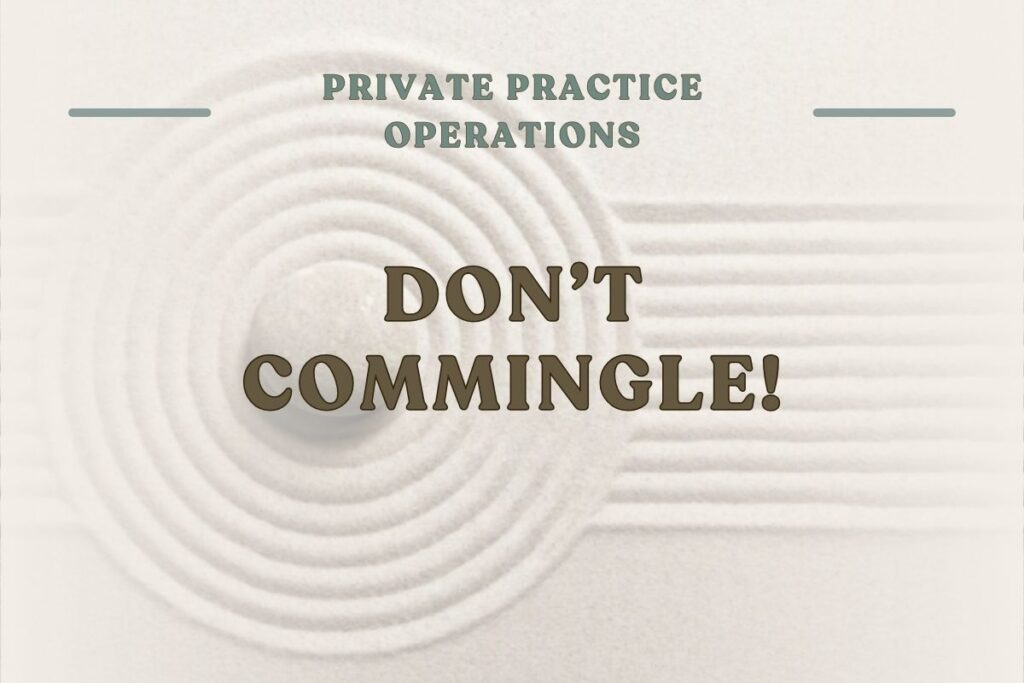The 5 Hidden Risks of Commingling Business & Personal Finances

What Is Commingling?
Commingling is when business and personal expenses are mixed together. If someone looked at your business bank account, would they find personal expenses? If someone looked at your personal bank account, would they find business expenses? Or worse, are you depositing revenue from your clients/patients into a personal bank account?
In some cases, commingling might seem harmless and might be done innocently or even accidentally. But there could be real implications.
The Risks of Mixing Business and Personal Finances
1. Legal Vulnerabilities
I’m not an attorney and this shouldn’t be considered legal advice, but my understanding is that commingling can lead to ‘piercing the corporate veil.’
One of the reasons practitioners form an LLC or S-corporation is to protect themselves from legal liability. If you get sued, the plaintiff can generally only go after the assets of the business, not your personal assets. But if you’re treating your finances as one and the same, then the courts are likely to allow the person suing you to pierce the corporate veil, that is, force you to treat your liability as one and the same. In short, your personal bank accounts, investments, house, etc could all be at risk.
Again, I’m not an attorney and you should check with yours for a more detailed explanation.
2. Red Flags with the IRS
While the IRS doesn’t explicitly ban commingling, they view it as a poor business practice that can lead to tax complications, increased audit risk, and potential loss of deductions. To avoid these issues, the IRS recommends maintaining separate accounts (IRS website) and clear documentation for business and personal finances.
3. Financial Clarity Issues
Mixing finances makes it nearly impossible to track your business’s true performance and will lead to inaccurate financial statements.
Without a clear separation, you’ll struggle to understand your business’s income, expenses, and profitability. Ambiguous financial data leads to uninformed decisions, like overspending or missing growth opportunities.
4. Impact on Securing Mortgages or Other Loans
When applying for a mortgage, business line of credit, or pretty much any other loan, the lender is going to check on the financial viability of your practice. Commingling not only makes the underwriting process much harder, it also paints you in a poor light. Keeping business and personal finances totally separate goes a long way in giving the lender the warm fuzzy feeling they’re looking for before lending you money.
5. Putting Your Professional License in Jeopardy
Professional licensing boards take financial misconduct seriously. Depending on your state and type of license (LPC, LMHC, LCSW, PhD, etc.), severe financial mismanagement – including extensive commingling – could result in disciplinary action or even license suspension.
Simple Steps to Separate Your Finances
Avoiding these pitfalls doesn’t have to be complicated. Follow these three steps to protect yourself and your business:
1. Open Separate Accounts
The foundation of financial separation is having dedicated accounts for business and personal use. If you don’t have a separate bank account for your practice, this should be top priority. Same for a business credit card.
My CPA firm strongly advises having a second bank account to be used for tax savings (to ensure against unpleasant surprises on April 15th).
Check out this article on our recommended two-account system.
2. Pay Yourself a Salary
Instead of dipping into your business account whenever you need funds, establish a consistent salary or owner’s draw (depending on what type of entity you are).
- How It Helps: This creates a clear boundary between personal and business finances.
- Pro Tip: If your income varies month-to-month, set a baseline salary and distribute bonuses during higher-earning periods.
3. Use Common Sense (or ask your CPA) to determine what are business vs. personal expenses
Most expenses should fall into obvious categories of business or personal. If you renew your professional license, that is obviously a business expense. If you go on a vacation, that is obviously a personal expense. All you have to do is pull the appropriate debit or credit card out of your wallet accordingly. If something is unclear (what about your cell phone that you use for business and personally???) ask your CPA for help.
The Bottom Line
Mixing business and personal finances might seem convenient and harmless, but it creates significant legal and financial risks.
A dedicated business bank account is your first line of defense against legal entanglements, sloppy books, and other headaches. If you haven’t opened a business account yet, for the love of God stop reading this article and go to the bank to open one!
By clearly separating personal and professional finances, you’re not only protecting your assets—you’re also laying the foundation for a more profitable, credible, and stress-free private practice.
